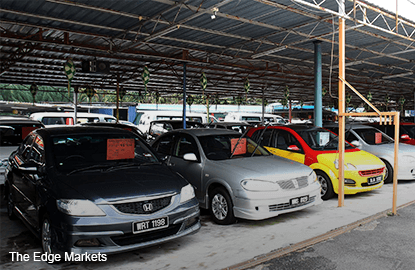
KUALA LUMPUR (Jan 14): Malaysia's total industry volume (TIV) of new vehicles is likely to see a 1.44% decline to 648,000 units this year from 2015, as vehicle sales start to feel the impact of economic pressures, a weak ringgit and general price increases, according to Frost & Sullivan.
Its vice-president of mobility Vivek Vaidya said TIV for 2015 is expected to come in 1.3% lower at 657,000 units, as the implementation of the goods and services tax (GST) and the onset of the weakening ringgit last year, took a toll on consumer confidence.
"Despite several original equipment manufacturers (OEMs) reducing prices post-GST, the economic downturn, weakening ringgit and increasing cost of living and cost of ownership discouraged buyers from making big purchases," Vaidya told reporters at the Frost & Sullivan’s 2016 Automotive & Transportation Outlook briefing today.
He said the two strategies that local OEMs could undertake to remain profitable is to introduce new exciting models, as well as consider exporting its products, as the weakening ringgit adds competitiveness to the export industry.
"Consumer confidence is at a 10-year low, and one of the ways for car manufacturers to remain profitable is to introduce new models, as Malaysian consumers do appreciate good value products at a right price.
"In terms of considering the export strategy, it is a great time for cars that are assembled in Malaysia to enter markets such as Thailand, Indonesia or Australia, as it would give higher margins," he added.
Vaidya also noted that the luxury car segment bucked the overall market trend last year, given the customers for high end cars are not affected by the market downturn.
"The luxury segment, worldwide, does not follow the overall economic slowdown. In the Malaysian context, this segment saw a 18% y-o-y growth to reach 23,000 units, driven mainly by Mercedes-Benz Malaysia, which had an outstanding year and held 47.8% of the market share in the segment," he explained.
Meanwhile, Vaidya does not foresee the Trans-Pacific Partnership Agreement (TPPA) as having any impact on the automotive industry until 2020, although he believes that signing up to the trade agreement would be a healthy prospect for the likes of Perusahaan Otomobil Kedua Sdn Bhd and Proton Holdings Bhd, which would give the local car makers access to more markets.
(Note: The Edge Research's fundamental score reflects a company’s profitability and balance sheet strength, calculated based on historical numbers. The valuation score determines if a stock is attractively valued or not, also based on historical numbers. A score of 3 suggests strong fundamentals and attractive valuations.)